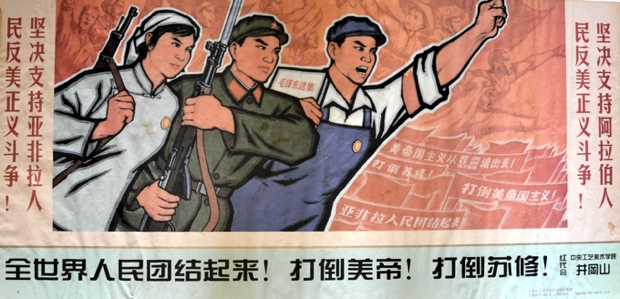
Chinese propaganda poster from the 1960s. Center text: “People of the World Unite! Overthrow American Imperialism! Overthrow Soviet Revisionism!” Left Text: “Resolutely Support the Righteous Struggle of the Asian, African and Latin People Against America!” Right Text: “Resolutely Support the Righteous Struggle of the Arabic People Against America.”
China’s recent defense white paper did not include a reiteration of the nation’s traditional commitment to never use nuclear weapons first. The omission was not a signal that China abandoned no first use, despite U.S. speculation to the contrary.
U.S. doubts about China’s commitment to no first use are not new. More importantly, they continue to undermine the bilateral dialog on nuclear weapons. These doubts are, in part, a product of the U.S. experience with the Soviet Union, which announced and later abandoned its no first use pledge. Conflating Communist China and the Soviet Union is an unfortunate U.S. habit, however, and especially misleading when thinking about Chinese nuclear weapons policy.
China announced its no first use policy in 1964 immediately after its first nuclear test. The promise was part of a broad declaration on intent that also included a commitment to the complete elimination of nuclear weapons. These commitments were articulated within an argument against contemporaneous developments in international nuclear arms control, specifically the ban on atmospheric testing proposed by the U.K., the U.S. and the Soviet Union. China’s explanation for this apparent contradiction is revealing and still relevant. It conveys the Chinese communist leadership’s unique perception of nuclear weapons and their role in international politics.
“China is developing nuclear weapons not because it believes in their omnipotence nor because it plans to use them. On the contrary, in developing nuclear weapons, China’s aim is to break the nuclear monopoly of the nuclear powers and to eliminate nuclear weapons. …
The Chinese government fully understands the good intentions of peace-loving countries and peoples in demanding an end to all nuclear tests. But more and more countries are coming to realize that the more exclusive the monopoly of nuclear weapons held by the U.S. imperialists and their partners, the greater the danger of a nuclear war. They are very arrogant when they have those weapons while you haven’t. But when those who oppose them also have such weapons, they will not be so haughty, their policy of nuclear blackmail and nuclear threats will not be so effective, and the possibility of complete prohibition and thorough destruction of nuclear weapons will increase.”
The Chinese leadership argued the established nuclear powers would never surrender their weapons, and the coercive power they engendered, if their privileged position was permanently protected by international law and practice. Their declaration, including no first use, was aimed at the non-nuclear weapons states. It was meant to communicate that China would be different; an attempt to justify its decision and persuade others that China would never use its nuclear weapons to coerce another state. This justification is central to China’s modern national identity as a leader of the developing world. For this reason, it is highly unlikely that China would abandon it, especially without a very public explanation, not necessarily to the United States, but to its intended audiences in Asia, Africa and Latin America.
It is easy for U.S. analysts to see the Chinese declaration as a disingenuous piece of political propaganda. But the Chinese communist leadership’s perception of nuclear weapons as an instrument of political blackmail is an understandable consequence of their own historical experience with the bomb. As Thomas Schelling points out in a recent interview, President Eisenhower “very conspicuously sent nuclear weapons to Taiwan” to protect the officially recognized government of China, led by the Nationalist Party, which retreated to the island in 1949 after losing control of the Chinese mainland to its communist rival. Eisenhower’s Secretary of State, John Foster Dulles, spoke publicly about eliminating the taboo against using nuclear weapons. In Schelling’s opinion, this indicates the U.S. was actually planning to use them, if necessary, to prevent the Chinese communists from launching a successful military campaign to end the long-running Chinese civil war. Schelling, an expert in strategy and bargaining, believes it was “the only time that the United States really might have used nuclear weapons again.”
It is difficult for U.S. analysts, officials and observers to appreciate the formative impact of a credible U.S. threat to use nuclear weapons to intervene in Chinese domestic politics. For many, the historical details were either never learned or are long forgotten. China’s historical memory is more frequently exercised. Differing conceptions of shared historical experience is not an uncommon problem in U.S.—China relations.
It is possible to imagine a creative new format for bilateral talks that would permit an extended and constructive excavation of those details. And it is conceivable this examination of a shared past could have a cathartic effect on a significant percentage of the participants from both sides of the cultural and historical divide. Given the seemingly irresistible appeal of a clearly dysfunctional debate on China’s no first use policy, it may be the only way to move beyond it.
